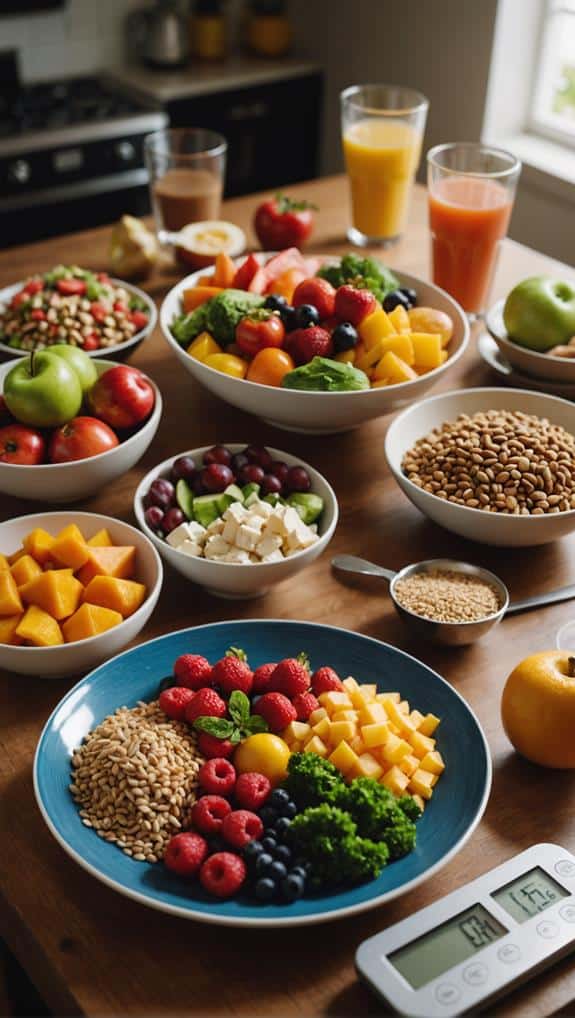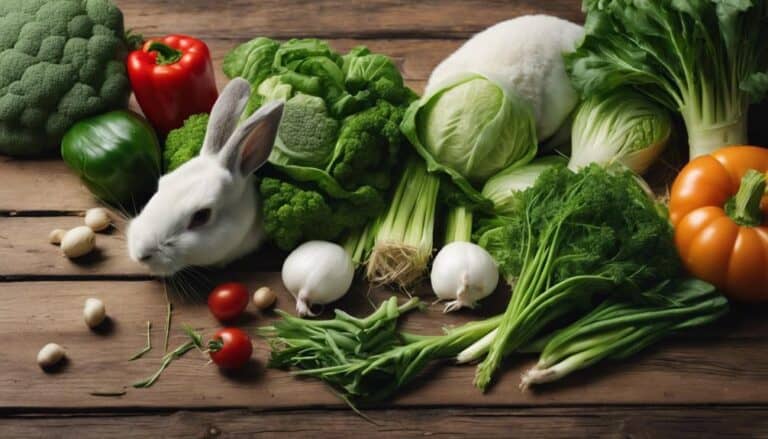As you explore the nutritional needs of seniors, you'll notice that their bodies require a specialized diet to maintain ideal health. They often face unique challenges, such as decreased thirst perception and common nutrient deficiencies that can lead to serious health issues. Understanding the importance of tailored dietary choices can greatly impact their well-being. But what specific nutrients should you focus on, and how can you guarantee they're getting enough of them in their daily meals? The answers might surprise you.
Contents
- 1 Unique Nutritional Needs of Seniors
- 2 Common Nutritional Deficiencies
- 3 Strategies for Healthy Eating
- 4 Importance of Protein and Nutrients
- 5 Hydration and Beverage Choices
- 6 Challenges to Healthy Eating
- 7 Social Aspects of Eating
- 8 Reading Nutrition Labels
- 9 Support and Resources for Seniors
- 10 Final Thoughts
Unique Nutritional Needs of Seniors

As you age, your body undergoes various changes that make it essential to pay close attention to your nutritional needs. For older adults, a diet rich in key nutrients like potassium, calcium, vitamin D, dietary fiber, and vitamin B12 is imperative to combat age-related physiological changes and reduce the risk of chronic diseases.
Prioritizing protein intake is particularly important; aim for over 1.2 grams of protein per kilogram of body weight to help maintain muscle mass and counteract sarcopenia.
Hydration can't be overlooked, as seniors often experience decreased thirst perception, raising the risk of dehydration. Ensuring adequate fluid intake is critical for overall health.
Additionally, choosing foods low in added sugars, saturated fats, and sodium supports heart health and minimizes the risk of conditions like hypertension and diabetes.
Incorporating a variety of nutrient-dense foods, such as fruits and vegetables, whole grains, and lean proteins, will greatly enhance your overall health and quality of life.
Common Nutritional Deficiencies
With age, nutritional deficiencies can creep in, considerably impacting your health and well-being. Many seniors struggle with insufficient levels of vitamin B12, calcium, and vitamin D, all necessary for maintaining muscle mass, bone health, and overall energy.
Iron deficiency, particularly severe anemia, affects up to 30.7% of men aged 85 and over, leading to fatigue and a decreased quality of life.
Dietary fiber intake is often inadequate among older adults, resulting in digestive issues and increasing the risk of chronic diseases like heart disease and diabetes.
Additionally, potassium, essential for heart health and blood pressure management, is frequently consumed at less-than-ideal levels, contributing to sodium-related health problems.
As you age, a decrease in appetite and nutrient absorption can lead to malnourishment, escalating risks for infections, weakened immunity, and prolonged recovery times from illness or injury.
Being aware of these common deficiencies is important for your health and the well-being of those you care for.
Strategies for Healthy Eating

Healthy eating is essential for seniors to maintain their well-being and vigor. You can support them by incorporating nutrient-dense foods like colorful fruits, vegetables, lean proteins, and whole grains into their meals. These options help meet increased nutritional needs while respecting lower calorie requirements.
Don't forget the significance of calcium and vitamin D. Utilizing low-fat dairy options and fortified plant-based milks guarantees they get enough of these fundamental nutrients for bone health.
Starting meals with vegetables can promote satiety, increase nutrient intake, and help prevent overeating, which is critical for maintaining a healthy weight.
Encouraging social meal-sharing opportunities, such as potlucks or community cooking activities, can enhance meal enjoyment and foster social connections, positively impacting dietary habits.
It's also beneficial to experiment with healthier ingredient swaps. For example, using applesauce instead of butter can enhance the nutritional profile without sacrificing taste.
Importance of Protein and Nutrients
Protein plays an essential role in maintaining strength and health for seniors. As you age, your body requires at least 1.0 to 1.2 grams of protein per kilogram of body weight daily to prevent muscle mass loss.
Alongside protein, key nutrients like calcium and vitamin D are critical for robust bone health, reducing the risk of osteoporosis and fractures.
You should also be aware that vitamin B12 absorption diminishes with age, making fortified foods or dietary supplements necessary to meet your nutritional needs.
Focusing on nutrient-dense foods, rich in dietary fiber, vitamins, and minerals, can considerably support overall health and help mitigate chronic disease risks.
Regular intake of micronutrients such as zinc and iron is essential as well. Deficiencies in these nutrients can lead to decreased immune function and heightened anemia rates, particularly among older adults.
By prioritizing these essential nutrients in your diet, you help bolster your immune system and enhance your quality of life.
In serving seniors, consider emphasizing the importance of a balanced diet that addresses their unique nutritional requirements, ensuring they remain healthy and active.
Hydration and Beverage Choices

Staying hydrated is vital for your overall health, especially as you age and may not feel thirsty as often.
Water should be your go-to beverage, but low-fat milk and unsweetened fruit juices can also provide hydration along with important nutrients.
Importance of Hydration
Many older adults don't realize how important hydration is for their overall health. As you age, your thirst perception decreases, making you more susceptible to dehydration, which can lead to serious health complications.
Here are three key reasons to prioritize hydration:
- Digestive Health: Adequate hydration helps maintain digestive health and prevents constipation, common issues among older adults.
- Nutrient Absorption: Water aids in the absorption of essential nutrients, ensuring your body gets what it needs to function properly.
- Cognitive Function: Staying hydrated supports cognitive function, helping you stay sharp and alert.
It's vital to encourage regular fluid intake throughout the day. Water is the healthiest option, as it contains no extra calories. Unsweetened fruit juices and low-fat milk can also contribute important nutrients.
Be mindful of alcohol consumption, as its effects can be intensified with age; limit it to two drinks per day for men and one for women.
Healthy Beverage Options
Choosing the right beverages can greatly impact your hydration and overall health as you age. As you may experience decreased thirst perception, it's crucial to encourage regular fluid intake throughout the day to prevent dehydration.
Water remains the best choice for staying hydrated, providing essential fluid without added calories. Unsweetened fruit juices and low-fat milk are also excellent healthy beverage options, offering valuable nutrients that support your health.
When selecting beverages, aim for those low in added sugars, saturated fats, and sodium. This helps prevent chronic diseases that can exacerbate existing health issues.
If you enjoy alcohol, remember to consume it in moderation—up to 2 drinks per day for men and 1 for women—as older adults often feel its effects more quickly, increasing the risk of falls.
To further aid hydration, consider incorporating fortified beverages. These options, enriched with electrolytes and vitamins, can meet your nutritional needs and help maintain overall health.
Challenges to Healthy Eating
Seniors often face significant challenges to healthy eating that can impact their overall well-being. Here are three key factors that contribute to these difficulties:
1. Health Conditions: Many older adults deal with oral health problems or conditions like dysphagia, complicating cooking and self-feeding. Additionally, certain dietary restrictions may be necessary due to underlying health issues, making it harder to find suitable food options that are both nutritious and enjoyable for them.
For example, nutritional considerations for bunny diets emphasize the importance of high-fiber, low-fat foods, which can similarly apply to seniors with specific dietary needs. Maintaining a balanced diet is crucial not only for bunnies but also for seniors who require a similar focus on nutrition. High fiber diets for rabbits promote optimal digestive health and prevent obesity, which can also be beneficial for older adults looking to maintain a healthy weight. By incorporating high-fiber foods such as leafy greens and whole grains, both groups can enjoy enhanced well-being and longevity.
2. Financial Constraints: Limited financial resources often restrict access to nutritious food options, forcing compromises that can worsen health issues.
3. Medications: Common medications can alter taste perception, cause dry mouth, or decrease appetite, which complicates maintaining a balanced diet.
These challenges can lead to decreased nutrient consumption and a heightened risk of foodborne illness. Changes in living situations, such as isolation or mobility issues, further exacerbate dietary habits, resulting in inadequate food intake and nutritional deficiencies.
Additionally, diminished senses of smell and taste can reduce food enjoyment, leading to malnutrition.
Understanding these barriers is vital for caregivers and loved ones. By recognizing the unique dietary needs of older adults, you can help support healthier eating patterns that promote better health outcomes and an improved quality of life.
Social Aspects of Eating

Eating together, whether at family gatherings or community events, plays an important role in enhancing the nutritional and emotional well-being of older adults. Regular social interactions during meals can be as beneficial as a consistent grooming routine for pets, as both foster a sense of community and well-being; for instance, proper grooming techniques can help maintain a pet's health much like social dining can aid seniors.
Sharing meals not only fosters social support but also greatly improves adherence to healthy eating habits. When older adults participate in communal dining or potluck events, they often experience reduced feelings of isolation, which is essential for maintaining a positive nutritional status.
Social engagement during mealtime can lead to increased appetite and regular meal consumption, important for overall health. In fact, over 50% of older adults living alone report decreased appetite, making these social interactions even more crucial.
By enjoying meals alongside family and friends, seniors are more likely to make better food choices, as shared meals typically feature healthier options and more diverse offerings.
Moreover, the camaraderie of eating together is linked to improved mood and cognitive function, further positively influencing their well-being. Encouraging older adults to join communal dining experiences can play a key role in their health journey, helping them enjoy food while nurturing important social connections.
Reading Nutrition Labels
Understanding nutrition labels can be a game changer for your health as you age.
By learning to identify key nutrients and make healthier choices, you can better manage chronic conditions and guarantee you're getting the vitamins and minerals your body needs.
Focusing on serving sizes and daily values can empower you to make informed decisions that promote your well-being.
Understanding Nutritional Information
How can you make healthier choices when shopping for groceries? Understanding food nutrition labels is essential for seniors aiming to improve their diets. Here are three key aspects to focus on:
- Serving Size: Check how much constitutes a serving to accurately gauge calorie intake.
- Nutrient Highlights: Look for important nutrients like vitamin D and vitamin B12, which are critical for your health.
- Daily Value Percentages: Use these percentages to assess if a food item meets your dietary needs.
By identifying nutrient content and being aware of added sugars, saturated fats, and sodium, you can avoid foods high in empty calories.
The U.S. FDA provides guidelines for interpreting these labels, emphasizing the importance of making informed choices. This knowledge can greatly enhance your overall nutritional status.
Identifying Healthy Choices
While maneuvering the grocery aisles, it's crucial to know how to identify healthy choices that align with your dietary needs. Understanding food nutrition labels is key to selecting nutrient-dense options, especially when managing chronic conditions that often accompany aging.
Start by checking for important nutrients like protein and calcium, which support muscle health and bone strength.
Pay attention to serving sizes listed on nutrition labels, as these can profoundly impact your nutrient intake and overall caloric consumption. Look for products with low added sugars, saturated fats, and sodium, since these can exacerbate health issues such as hypertension and diabetes.
Familiarizing yourself with Daily Value percentages on nutrition labels can also help you assess whether a particular food item meets your daily nutritional needs. Aim for items rich in fiber and essential vitamins, as these nutrients may be lacking in many diets.
By making informed choices, you can better support your health and well-being, ensuring that the meals you prepare not only nourish you but also enhance your quality of life.
Support and Resources for Seniors

Accessing support and resources can considerably improve the nutritional health and overall well-being of seniors. A balanced diet is essential for maintaining health, just as unique dietary needs can be observed in specific populations, such as breeds of bunnies with unique eye colors.
Here are three key ways to enhance their dietary experience:
- Meal Assistance Programs: Many local senior centers offer meal assistance programs, ensuring access to nutritious food while fostering social interaction.
- Supplemental Nutrition Assistance Program (SNAP): This government initiative helps seniors afford healthy meals, markedly reducing food insecurity.
- Health Care Provider Consultations: Regular discussions with healthcare providers can tailor dietary supplements to address age-related nutritional needs.
Utilizing these resources can make a substantial difference in a senior's life. Online health resources, like MedlinePlus, provide valuable information on nutrition and meal planning specific to aging adults.
Additionally, professional care services can assist with meal preparation, ensuring that seniors facing physical challenges still receive the nutrition they need.
Final Thoughts
In summary, understanding the unique nutritional needs of seniors isn't just about food—it's about enhancing their quality of life. Imagine sharing a meal with a loved one, knowing that each bite is helping them stay healthy and vibrant. By focusing on nutrient-dense foods and staying hydrated, you can support their well-being and foster meaningful connections. With the right resources and strategies, you can make a significant difference, ensuring they thrive in this precious stage of life.






